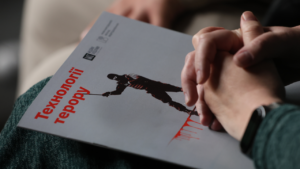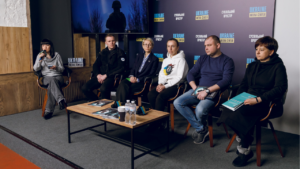Russian Forces Target Health Care to Control Civilian Population in Ukraine’s Occupied Territories, New Evidence Suggests

A case study from human rights organizations documents a series of coercive measures targeting patients and health care personnel in Russian-occupied territories to enforce civilian control.
Russian authorities have systematically sought to target Ukraine’s health care system as a way to cement their control over the civilian population in Ukrainian territories under occupation, a new case study by Media Initiative for Human Rights and partner organizations shows. These violations of the laws of war and human rights demand proper investigation and accountability, including by the International Criminal Court and other prosecutors–in Ukraine and abroad–with jurisdiction.
“Coercion and Control: Ukraine’s Health Care System Under Russian Occupation,” co-published today by eyeWitness to Atrocities, Insecurity Insight, Media Initiative for Human Rights (MIHR), and Physicians for Human Rights, demonstrates how Russia’s actions, including detaining health care workers, requiring forced changes of nationality as a precondition for gaining access to health care, and repurposing health facilities for nonmedical purposes, have compromised civilians’ right to health and imperiled access to essential health services.
“Through coercion and control, Russian forces seek to intimidate both patients and health care professionals in Ukraine’s occupied territories, violating their respective abilities to access critical health services and provide the fundamental human right to health,” said Christian De Vos, JD, PhD, director of research and investigations at PHR. “Without meaningful accountability for these violations of international law, Russian forces will continue to act with impunity. We urge international bodies with relevant jurisdiction to vigorously investigate and prosecute these crimes.”
The study, which covers the period from the start of Russia’s full-scale invasion through September 2023, identifies three primary methods that Russian forces have reportedly employed to hamper health care access and thereby expand Russia’s coercion of and control over Ukraine’s civilian population. These include reports of the misuse of health facilities for nonmedical purposes; forced “passportization,” whereby civilian access to health care is conditioned on changing one’s nationality from Ukrainian to Russian; and threatening and harassing health care personnel. For each of these categories, the report details the potential implications of Russia’s actions under international humanitarian law and international human rights law.
Based on the dataset jointly maintained by these independent organizations, there have been at least:
- 16 reported incidents where a health facility, including a former children’s hospital, was repurposed for nonmedical use, such as military bases and weapons storage facilities;
- 34 reported incidents where civilian patients were forcibly evicted from health facilities or denied access to health care, and the facilities were then reportedly repurposed for the use of wounded soldiers;
- 23 reported incidents where medical supplies were requisitioned by Russian forces;
- 15 reported incidents of “passportization,” or denying medical care to people without a Russian passport or coercing civilians into obtaining one to access health care; and
- 68 health care workers who were detained in 17 separate incidents.
Across the Russian-occupied territories, there are many credible reports of Ukrainian health care workers being detained, arrested, and persecuted by Russian forces. In some cases, these providers appear to have been forced to violate their professional and ethical obligations to their patients.
“Russian authorities have locked up dozens of Ukrainian doctors and nurses in the occupied territories for not agreeing to cooperate with the occupying authorities, taking a Russian passport, or refusing to provide personal data of their patients,” said Lyubov Smachylo, analyst at MIHR. “These illegal detentions cannot stand. We call for the immediate and unconditional release of Ukrainian health personnel and for Russia to cease all attacks on the health care system.”
“Our research sheds new light on the grim realities that patients and providers alike are forced to endure in order to access and provide basic health services,” said Christina Wille, director of Insecurity Insight. “For years, our organization has monitored attacks on health care amid armed conflict across the world, and these coercive measures are part of a disturbing pattern of lack of protection of health care in conflict.”
Informed by in-depth interviews with Ukrainian health care workers and incident data drawn from audiovisual evidence and open-source research, the study underscores the harsh realities facing civilians and health care workers and details an apparent pattern of conduct that demands further investigation. The study provides a rare window into how civilians, health care providers, and Ukraine’s health care system more broadly are faring in these occupied regions, where outside access remains limited.
“The case study highlights reports of challenging conditions faced by civilians and health care workers in Russian-occupied territories,” said Carrie Bowker, director of eyeWitness to Atrocities. “The reported incidents are deeply concerning, and underscore the urgent need for thorough investigation by prosecutors.”
Read the full study below.
This study follows a February 2023 report from PHR, MIHR, Insecurity Insight, eyeWitness to Atrocities, and the Ukrainian Healthcare Center that documented extensive attacks perpetrated against Ukraine’s hospitals, health workers, and other medical infrastructure since February 2022. That report showed how Russian forces appeared to be both deliberately and indiscriminately targeting Ukraine’s health care system as part of a broader attack on its civilian population and infrastructure. It established a reasonable basis to believe that these attacks constitute war crimes and potentially crimes against humanity as well.
The main image for this article was created by Victoria Kotlyarchuk / Getty Images






